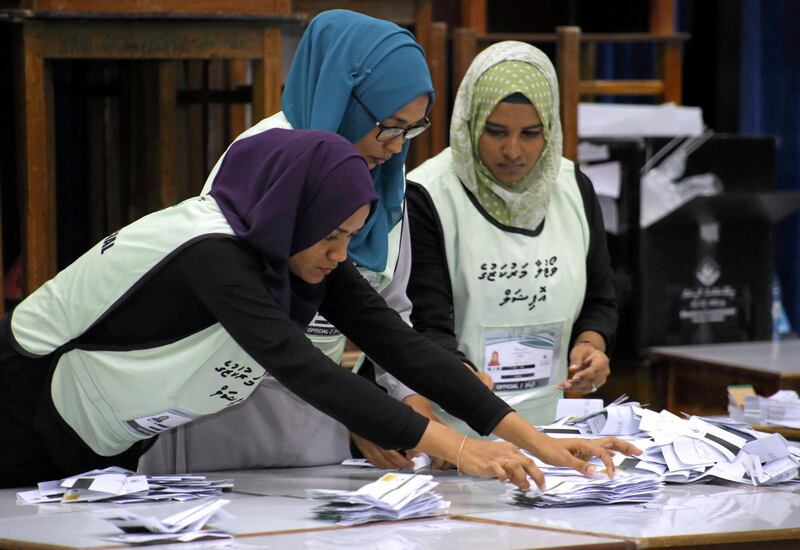Maldives' opposition leader claimed victory in Sunday's presidential election, which was widely seen as a referendum on the island nation's young democracy.
A raid on the opposition's main campaign office and the specter of US sanctions on government officials did not deter thousands of people from voting for change in the country's election.
A high turnout left Ibrahim Mohamed Solih, a longtime but little-known lawmaker, with a 16 percent margin after almost all of the votes had been counted.
"This is a moment of happiness, a moment of hope," Mr Solih, popularly known as Ibu, said in Male.
"The message is loud and clear. The people of Maldives want change, peace and justice. I would like to call on President Yameen to accept the will of the people and begin a smooth transition of power as per the constitution."
Mr Solih had 58.3 percent of the vote with 92 percent of the vote counted. Mr Yameen's campaign had not conceded the race.
Supporters of Mr Solih, draped in the Maldives' flag took to the streets, hugging one another, cheering and honking horns to celebrate his unexpected win.
Election watchdog Transparency Maldives tweeted that Mr Solih had won "by a decisive margin."
Our quick count results indicate that Ibrahim Mohamed Solih has won the 2018 Presidential Election by a decisive margin. We call on all stakeholders to maintain an environment conducive for a peaceful transfer of power. #MVElection2018 pic.twitter.com/cfTRDALpNl
— Transparency MV (@TransparencyMV) September 23, 2018
A spokesman for Maldives' Election Commission said official results wouldn't be announced for a week, the period reserved for parties to file election petitions in court challenging the result.
As results rolled in, under the gaze of people in the Maldives and observers outside the tiny, tropical South Asian country, the opposition's fears of a rigged vote appeared to be unnecessary.
Regional rivals India and China, jostling for greater influence in South Asia, were also watching the process closely.
Famed for its white-sand beaches and luxury resorts, the Maldives under President Yameen Abdul Gayoom, who was seeking re-election, saw economic growth and longer life expectancy, according to the World Bank. But Yameen's critics, including Mr Solih, say he has systematically rolled back democratic freedoms, jailing rivals, controlling the courts and cracking down on the media.
Few foreign media organisations were allowed in to cover the election, and there have been warnings that the Maldives is slipping back to autocratic rule, just a decade after achieving democracy.
Aiman Rasheed of the independent watchdog group Transparency Maldives described Sunday's vote as "a referendum on authoritarianism versus freedom".
In February, Mr Yameen declared a state of emergency, suspended the constitution and ordered troops to storm the Supreme Court and arrest judges and other rivals to stave off impeachment.
What's at stake in the small South Asian country came into sharp focus again on Saturday, when police in Male, the capital, raided Mr Solih's main campaign office, citing police intelligence that the office was being used to organise vote-buying, according to a copy of a police warrant.
_______________
Read more:
Maldives tourism thrives despite political crackdown
Ex-leader wants India to intervene to free Maldives judges
Maldives government in standoff with supreme court
_______________
The warrant also said that Mr Solih's senior campaign official Ahmed Shahid was suspected of bribing voters. No arrests were made.
Opposition supporters in the Maldives and in neighboring Sri Lanka, where former President Mohamed Nasheed lives in exile, decried the raid as a naked attempt to rig the vote in favor of Mr Yameen.
Despite the turmoil, voters flocked to the polls on Sunday, standing in long lines in rain and high temperatures to cast ballots. Voters also stood in long lines in Malaysia, the UK, India and Sri Lanka, where the opposition had encouraged overseas Maldivians to participate. Some Maldivian voters in Sri Lanka's capital, Colombo, said they waited nine hours because of verification delays to cast their ballots.
The polls in the Maldives were originally scheduled to close at 4pm, but opening hours were extended by three hours due to high voter turnout, said election commission spokesman Ahmed Akram.
Outside a polling station at the Imauddin School in Male, aviation worker Mohamed Ismail, 23, said he cast his ballot for Mr Solih because "people live in fear" under strongman President Yameen, who took office in 2013.
Mr Yameen used his first term in office to consolidate power, jailing opponents, including his half brother, a former president, and two Supreme Court Justices, and asserting control over the courts.
The European Union said Friday that it was not sending election observers because the Maldives had failed to meet the basic conditions for monitoring. The US has threatened to sanction Maldivian officials if the elections are not free and fair.
"Look around. People are moving freely," said one voter, Adam Thaufeeg, a 40-year-old government employee. He said he voted for Mr Yameen because of his vision for developing the Maldives.
More than 260,000 of the Maldives' 400,000 people were eligible to vote at about 400 polling stations across the islands that comprise the Indian Ocean archipelago.





